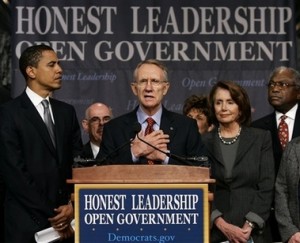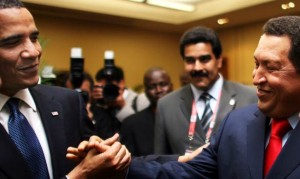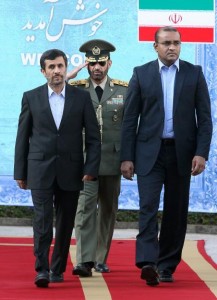
President Barack Obama and Democratic Senate Majority Leader Harry Reid Had a Very Different View the Use of Reconciliation in 2005
Explosive new video has surfaced today that shows President Barack Obama, and many other prominent Democrats condemning the Bush Administration in 2005 for Bush’s attempt to use reconciliation to push through judicial nominees. These 2005 quotes are particularly jarring when compared to the 2010 quotes from the same folks about Obama’s attempt to use reconciliation to pass Obamacare. Senator Barack Obama, on 4/26/05, in response to a question on the “nuclear option” (how Democrats in 2005 characterized then-President Bush’s attempts to use reconciliation):
“He hasn’t gotten his way…uh…and that is now prompting a change in the Senate rules that really I think would change the character of the Senate uh forever and uh what I worry about would be that you essentially have still two chambers the House and the Senate but you have simply majoritarian uh absolute power on on either side and that’s just not what the Founders intended.”
Present Senate Majority Leader Harry Reid weighs in as well back on 5/18/2005, noting that
“The right to extend a debate is never more important than when one party controls both Congress and the White House. The filibuster serves as a check, on power, preserve our limited government.”
Considering Leader Reid’s comments yesterday that the Republicans should “stop crying” about Obama’s planned use of reconciliation to push through Obamacare, Reid’s comments in 2005 are particularly explosive in terms of today’s health care debate. Present Secretary of State Hillary Clinton also chimed in with a verbal barrage on 5/23/2005 against then President Bush about controlling himself and calling upon her GOP collegues to go to Bush and tell him reconciliation is “a bridge to far” and that “you have to restrain yourself Mr. President.” One could argue, in aftermath of the shocking GOP upset win in the Massachusetts Senate race in January 2010 by a candidate, Scott Brown, who explicitly campaigned against passing Obamacare, that a Senator from the Democratic side should have the type of conversation with the President as suggested by Secretary Clinton back in 2005.
Vice President Joe Biden weighed in with his familiar bombastic rhetoric in 2005 as well, stating that “this nuclear option is ultimately an example of the arrogance of power…it is a fundamental power grab” and further opining in prayer that “”I pray God when the Democrats take back control we don’t make the kind of naked power grab you are doing.” Of course, Biden now supports the Obama Administration’s plan to use reconciliation to push Obamacare through the Senate with only 50 votes (and his tie breaking vote).
A common theme of all of the Democratic Senators remarks in 2005 revolves around the destruction of the “Republic” and the elimination of the “checks and balances” intended by the Founders that would ensue should President Bush succeed in his effort to use reconciliation. Senator Chuck Schumer (D-NY), who is now leading the Senate effort to pass a public option through reconciliation, had this to say on 5/18/2005 about Bush’s attempt to use reconciliation:
“We are on the precipice of a crisis, a constitutional crisis. The checks and balances which have been at the core of this Republic are about to be evaporated by the nuclear option. The checks and balances which say if you get 51% of the vote, you dont get your way 100% of the time. It is amazing its almost a temper tantrum.”
Democratic Senator Diane Feinstein (D-Ca.) also condemned Bush for attempting to use reconciliation, stating if used reconciliation would mean “the Senate becomes ipso facto, the House of Representatives” while also showing her more dire concern is the use of reconciliation for substantive legislation, not judicial nominees, by stating Bush will start with reconciliation for judicial nominees but then move on to its use in legislation. Perhaps most bombastic of all in 2005 regarding Bush’s attempted use of reconciliation is Democratic Senator Max Baucus (D-ND), who solemnly stated that “[t]his is the way that Democracy ends not with a bomb, but with a gavel”. Of course, Bush did not actually use reconciliation to get his nominees through the Senate as a bipartisan deal was reached.
Incredibly, each and every one of the above-quoted then-Democratic Senators, Obama, Reid, Biden, Clinton, Schumer, Baucus and Feinstein, are in favor of the use of reconciliation to pass Obamacare, with many of those same folks actively leading the effort, including now-President Obama. Perhaps an enterprising reporter could ask Harry Reid to explain if this comment also applies to Democratic Administrations like Obama’s: “No, we’re not going to follow the Senate rules…no…because of the arrogance of power of this Republican Administration.” Finally, Harry Reid posts in April 2005 on his Senate website an explanation as to why the improper use of reconciliation must be rejected and the claim to entitlement to an “up or down vote” is suspect:
For the past several months, the Senate has operated under a nuclear cloud. As a result of the Senate’s decision to reject a small number of President Bush’s judicial nominees, the Republican majority has threatened to break the Senate rules, violate over 200 years of Senate tradition and impair the ability of Democrats and Republicans to work together on issues of real concern to the American people.
It is astounding that Republicans would precipitate this destructive confrontation, especially since this President has a better confirmation rate than any of his recent predecessors. The Senate has confirmed 205 of President Bush’s judicial candidates and turned back only ten, a 95% confirmation rate. Ten rejected judges – only seven of whom are currently before the Senate – does not seem reason enough for Republicans to break the Senate rules.
My Republican colleagues claim that nominees are entitled to an up-down vote. That claim ignores history, including recent history.
UPDATE: ABC’s Jake Tapper adds another Obama 2005 quote on reconciliation and the Framers of the Constitution:
At the National Press Club on April 26, 2005, then-Sen. Barack Obama, D-Ill., was asked about a move being discussed by Senate Republicans, then in control, to change the Senate rules so as to require a mere majority vote rather than the 60 votes necessary to end a potential filibuster.
“You know, the Founders designed this system, as frustrating it is, to make sure that there’s a broad consensus before the country moves forward,” then-Sen. Obama told the audience.
His remarks have garnered some attention in recent days given the current likelihood that Senate Democrats will next week use “reconciliation” rules, which require only a 51-vote majority, to pass health care reform legislation, bypassing the current Senate rules of requiring 60 votes to cut off a potential filibuster and proceed to a final vote.
The White House has been in recent days setting the table for use of reconciliation rules for health care reform.
UPDATE #2: American Spectator’s blog reprints the 2005 comments by the various Democratic Senators in full.
UPDATE #3: Thanks for the link, Memeorandum.com. Welcome to Memeorandum readers, please take a look around and stay a while. A quick flashback to early February 2010, when President Obama and the new media left were in full attack mode about the evils of the filibuster. This excerpt supplies a stark contrast to the comments made by the left-leaning Democratic Senators quoted above in 2005 when Bush was trying to circumvent the Senate filibuster with Obama’s comments in bold:
The Filibuster Was Never a Good Idea
Yesterday, talking to Democratic Senators, the president offered some thoughts on the filibuster:
So the problem here you’ve got is an institution that increasingly is not adapted to the demands of a hugely competitive 21st century economy. I think the Senate in particular, the challenge that I gave to Republicans and I will continue to issue to Republicans is if you want to govern then you can’t just say no. It can’t just be about scoring points. There are multiple examples during the course of this year in which that’s been the case.
Look, I mentioned the filibuster record. We’ve had scores of pieces of legislation in which there was a filibuster, cloture had to be invoked, and then ended up passing 90 to 10, or 80 to 15. And what that indicates is a degree to which we’re just trying to gum up the works instead of getting business done.
I appreciate what the President is trying to do here and I agree with the spirit of his comments, but the history here is bad. There was no point in time when supermajority voting in the Senate was well-suited to the challenges of the time. Indeed, as David Mayhew has demonstrated it’s simply not the case that there was routine supermajority voting until the recent past. When FDR’s opponents were seeking to block court-packing and when LBJ was lining up support for Medicare, vote-counters assumed that a majority was needed to block initiatives.
The authentic tradition is of using the filibuster as an extraordinary technique for the specific purpose of maintaining white supremacy in the South. A Harding administration anti-lynching initiative fell prey to the filibuster back in the 20s. The Civil Rights Act of 1957 and the Civil Rights Act of 1960 both had to be largely gutted in order to surmount filibusters. And it was recollection of the filibuster’s specific role as a bastion of white supremacy that led to the bipartisan effort to reform the filibuster in 1975 when northern liberal Democrats teamed up with the Ford administration and many Republicans to cut the cloture threshold to 60.
The institution has always been pernicious, just as the malapportionment of the Senate has always been the result of a hardball political negotiation rather than expressing some underlying good idea about the design of political institutions. Part of what makes the filibuster a bad idea is that it’s viability depends on minority party restraint. But the nature of human psychology is to create a procedural downward spiral in which each time there’s a change of partisan control, the new minority steps-up its obstruction.
Technorati Tags: Absolute Power, Barack Obama, Bush Administration, Collegues, Democratic Senate, Filibuster, Founders, Harry Reid, Health Care Debate, Hillary Clinton, Judicial Nominees, Massachusetts Senate, Mr President, Nuclear Option, President Bush, Reconciliation, Senate Majority Leader, Senate Majority Leader Harry, Senate Majority Leader Harry Reid, Senate Race, Senate Rules, Senator Barack Obama, Verbal Barrage







